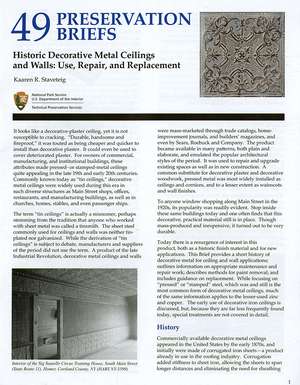Historic Decorative Metal Ceilings and Walls: Use, Repair, and Replacement
Editat de National Park Service, Technical Preservation Services (U.S.) Autor Karen R. Staveteigen Limba Engleză Paperback – 2 apr 2017 – vârsta de la 18 până la 95 ani
ThisPreservation
Brief
(#49)within
the
Preservation
Briefs
series
produced
by
the
U.S.
National
Park
Service,
Technical
Preservation
Services
Division,
provides
a
short
history
of
decorative
metal
for
ceiling
and
wall
applications;
outlines
information
on
appropriate
maintenance
and
repair
work;
describes
methods
for
paint
removal;
and
includes
guidance
on
replacement.
While
focusing
on
“pressed”
or
“stamped”
steel,
which
was
and
still
is
the
most
common
form
of
decorative
metal
ceilings,
much
of
the
same
information
applies
to
the
lesser-used
zinc
and
copper.
Back in the late 19th and early 20th centuries and a product of the Industrial Revolution, these products were mass-marketed through trade catalogs, home-improvement journals, and builders’ magazines, and even by Sears, Roebuck and Company. The product became available in many patterns, both plain and elaborate, and emulated the popular architectural styles of the period. It was used to repair and upgrade existing spaces as well as in new construction. A common substitute for decorative plaster and decorative woodwork, pressed metal was most widely installed as ceilings and cornices, and to a lesser extent as wainscots and wall finishes.
This decorative element is seen as having a resurgence in today’s society, both as a historic finish material and for new applications. Pressed-metal ceilings and walls are important, character-defining interior finishes that can be found in almost all types of historic buildings, from stores to offices and churches to factories. Understanding and copying the distinctive qualities of individual design patterns, utilizing appropriate installation techniques, and creating compatible finishes are important components of good replacement work. While maintenance and repair are always the preferred treatment, available products today enable many historic patterns to be closely matched in cases of badly deteriorated metal walls and ceilings or where missing altogether.
Manufacturers of these materials, home and office contractors and construction crews, historic and registered landmark homes and property owners, architects, and some building inspectors may be interested in this Brief.
Related products:
Construction & Architecture resources collectioncan be found here:https://bookstore.gpo.gov/catalog/science-technology/construction-architecture
Back in the late 19th and early 20th centuries and a product of the Industrial Revolution, these products were mass-marketed through trade catalogs, home-improvement journals, and builders’ magazines, and even by Sears, Roebuck and Company. The product became available in many patterns, both plain and elaborate, and emulated the popular architectural styles of the period. It was used to repair and upgrade existing spaces as well as in new construction. A common substitute for decorative plaster and decorative woodwork, pressed metal was most widely installed as ceilings and cornices, and to a lesser extent as wainscots and wall finishes.
This decorative element is seen as having a resurgence in today’s society, both as a historic finish material and for new applications. Pressed-metal ceilings and walls are important, character-defining interior finishes that can be found in almost all types of historic buildings, from stores to offices and churches to factories. Understanding and copying the distinctive qualities of individual design patterns, utilizing appropriate installation techniques, and creating compatible finishes are important components of good replacement work. While maintenance and repair are always the preferred treatment, available products today enable many historic patterns to be closely matched in cases of badly deteriorated metal walls and ceilings or where missing altogether.
Manufacturers of these materials, home and office contractors and construction crews, historic and registered landmark homes and property owners, architects, and some building inspectors may be interested in this Brief.
Related products:
Construction & Architecture resources collectioncan be found here:https://bookstore.gpo.gov/catalog/science-technology/construction-architecture
Preț: 46.85 lei
Nou
Puncte Express: 70
Preț estimativ în valută:
8.96€ • 9.34$ • 7.42£
8.96€ • 9.34$ • 7.42£
Carte indisponibilă temporar
Doresc să fiu notificat când acest titlu va fi disponibil:
Se trimite...
Preluare comenzi: 021 569.72.76
Specificații
ISBN-13: 9780160936302
ISBN-10: 0160936306
Pagini: 18
Greutate: 0.11 kg
Editura: United States Dept. of the Interior
Colecția National Park Service
ISBN-10: 0160936306
Pagini: 18
Greutate: 0.11 kg
Editura: United States Dept. of the Interior
Colecția National Park Service
